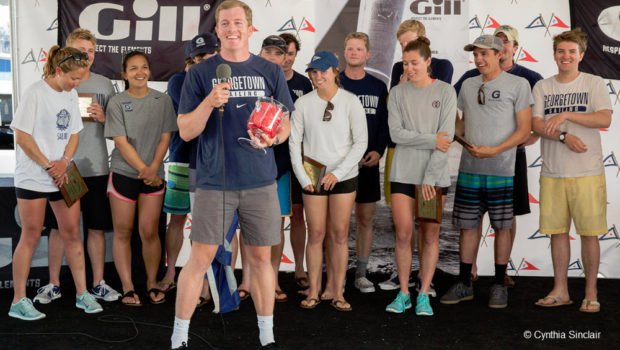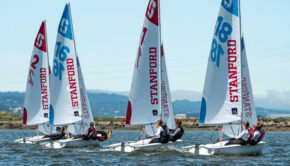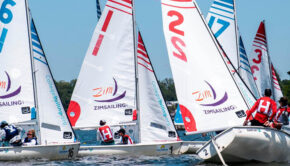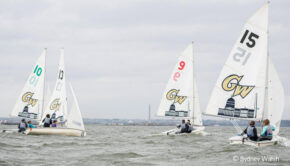Nevin Snow: Being the Best College Sailor
Published on June 8th, 2016
Since 1968, Intercollegiate Sailing Association has annually presented the Everett Morris Memorial Trophy to the person deemed the ‘Best Intercollegiate Sailor’ for that season. Only five people have won it twice – Gary Jobson, Morgan Reeser, Terry Hutchinson, Brad Rodi, and Charlie Buckingham. Now there are six… Nevin Snow.
After Snow’s Georgetown Hoyas won the College Coed Nationals in his hometown of San Diego, CA, Scuttlebutt editor Craig Leweck spoke to him about the achievement…
What’s it like finishing your college career in San Diego?
It reminded me of high school sailing, as San Diego Bay is so much like a lot of the high school venues we sailed in California. It brought me back to just hanging out with my Cathedral Catholic High School team on the pier. Having offsets during Semi-Finals where A Division would sail and B Division would be off, and B would sail and A would be off. Just hanging out, having fruit snacks and figuring out a way to stay in the mode for an hour before you raced again. In that respect, yeah, it sort of brought me to high school sailing.
Let’s talk about the Sailor of the Year award. Is it something you think about much during the year?
It’s hard not to, but I have thought about it a bit less each year. I have brought it into perspective as the selection process is not something you can control.
In my sophomore year, I was a finalist for the award and didn’t win. Our team finished second in Nationals that year, and while our B Division team sailed out of their mind, I felt I had let the team down in A Division. I wasn’t there like I had been the whole year. So for the junior year, and then even more so this year, I tried to keep my focus on the team.
I will admit that during the winter time when we have sailing off, it’s impossible not to look back at my results and think, ‘How’d I do compared to last year when I won it?’ And I might think how to make my schedule look as compelling as possible. But above all, it was a lot easier to switch on team mode and just focus on the team while we’re at the regattas.
During Nationals, I was impressed with how I was able to keep that focus, but I knew that it’s how I prepared. To be honest, up until when they announced I won, I hadn’t really thought about the award all that much. Not to diminish the honor, but I think that approach helped me win it.
It is a unique award as college sailing is a team sport.
I look at both the other finalists, Raul Rios ’17 at Boston College and Ian Barrows ’17 at Yale, and I think of them as the type of people that epitomize this approach. People that can put their team in front of themselves are the ones that end up winning that award, because they sail with the carefree notion of always wanting to do better for their teammates. And that’s really what we stress at Georgetown this year. It was to win nationals for each other, and everything else – the awards, the All-American recognition – will follow.
Who are some of the people you can think back to that elevated your skills?
The first captain of our team when I got to Georgetown was Chris Barnard, who was Sailor of the Year in 2012. I looked up to him a lot, particularly for his consistency throughout the college sailing year. He taught me how to sail the small regattas and also the big regattas throughout the year, and how to use it all to peak for nationals. Also, Graham Landy ’17 at Yale. He and I were the only two finalists for the past two years. I’d follow his results and looked forward to our races together. Graham pushed me to become better, and I like to think I pushed him to become better too. He won the award in 2014 and I got it in 2015.
You got the award in Graham’s final year?
I didn’t want him to graduate without me feeling like I’d gotten him at least once. He had gotten me a lot, and his team had won Coed Nationals both those years. Their team was really good, so he was someone definitely that I looked up to as a role model.
Since 2006, Georgetown has produced seven recipients of the Sailor of the Year award, plus Sydney Bolger won the Women’s award in 2012. What’s in the Potomac River?
We wonder that too. I think knowing that it’s possible is probably the biggest reason for this kind of notoriety. Certainly our coach Mike Callahan is another reason. He’s a Hoya and has been coaching the team since he graduated in 1997. He knows what can contribute to winning the award, and has at times tailored my sailing schedule to that.
I didn’t travel up to New England as much as people might think. Despite people seeing it as the “hot bed” of college sailing, I really didn’t sail there all that much. By not sailing on places like the Charles River, I think it kept me ready for regattas like this.
Can past success breed confidence?
For sure, it’s comforting knowing that I’m a Georgetown sailor. If I don’t do all that well in this regatta, someone else is going to pick me up, and that puts you at ease to be able to do well in that regatta. That’s the same for Yale, for Boston College, for all the top teams at nationals. Everyone’s team is so deep.
Maybe it’s just accentuated at Georgetown because we do have a huge team. With nearly 60 people, they all come to practice almost every day. We had six skippers at Nationals that could have all started. So knowing that, and as long as we keep team first, it’s really easy to just relax on the starting line and excel.
Let’s talk about an aspect of racing unique to college sailing. At Nationals, you sailed 18 races in the Finals. How do you mentally deal with the highs and lows?
Oh man! That’s definitely something I have worked on over the years. At Nationals, Ian Barrows ’17 won A Division for Yale with 119 points. That’s finishing about 7th out of 18 boats every race. I finished tied for second with 127. That is so many points, but you see it all the time. It’s not that hard to post a big score, but it takes experience and maturity to move beyond it.
This may be the most important attribute to succeed in College sailing. We started Nationals feeling like we were in tenth place, and we come off the water and we’re just ten points back from first. Most of the time you just have no idea what the scores are. There are so many different variables in college sailing. All you can control is your own mind and your own race.
Any other advice for someone just getting started in their college sailing career?
The biggest thing – and something that I definitely overdo as I know how important it is – is to bring the intensity to practice. Each week we might work on starts or other maneuvers, but Thursday is ‘race day” and I treat it like the beginning of the national championships. I get so amped and pissed off when I don’t win race day. I think the intensity brings our team together.
You look at someone like Campbell D’Eliscu ’19, who sailed B Division at Nationals. He’s a freshman sailing in his biggest event, but he was ready because he took race day as seriously as anyone I’ve ever seen it. He took every practice day very seriously; we’d get pissed when we lost drills to each other.
So bringing the attitude every day to practice that you can see yourself wanting to bring to a national championship, I’ve got to think that that’s one of the most important things to my sailing, and how far it’s gotten me in college sailing. I think it’s going to get him and other Hoyas and other college sailors to where they want to get to. It’s how you get better.










 We’ll keep your information safe.
We’ll keep your information safe.